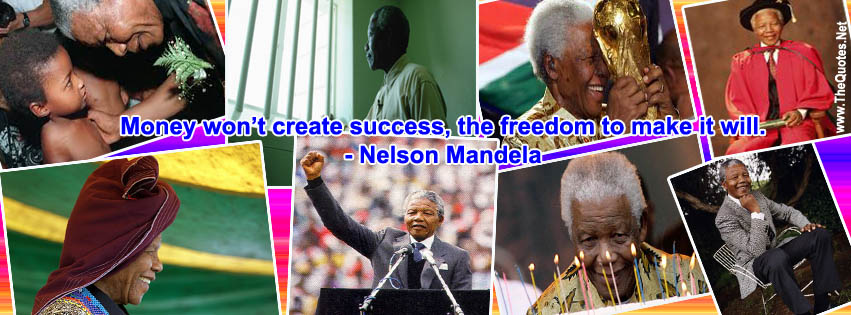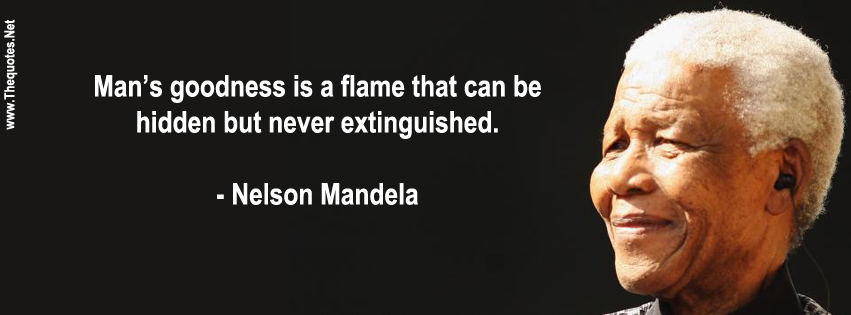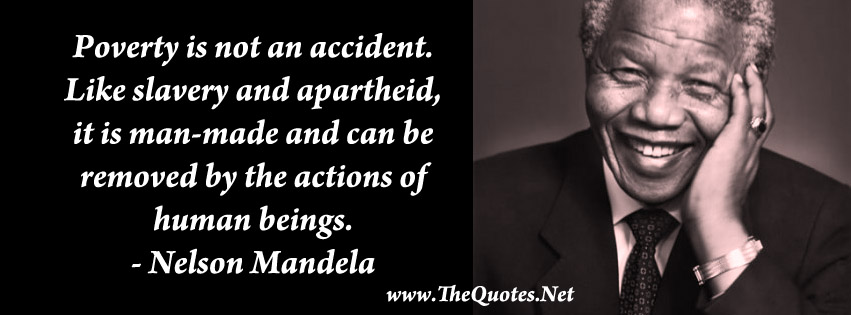The World is having lot of leaders in various countries. Some may be just Famous, some may be courageous, some may be helping their own people, some may be having good heart, some may be Charismatic, and some may be having intention to help entire world. But it is very very rare to see a leader with all these qualities and lot more good qualities combined together .
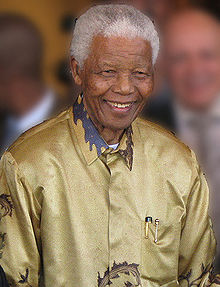
Nelson Mandela is one such great Leader in 20th Century. It is very hard to see any other leader like him.
Nelson Mandela was the first black President of South Africa. He spent 27 years in prison for trying to overthrow the pro-apartheid government. After he left prison, he worked to achieve human rights and a better future for everyone in South Africa.
Nelson Mandela was born in 1918. He was in prison from 1962 to 1990. He became President of South Africa in 1994, and retired in 1999.
Nelson Mandela became famous for his long fight against bad government and racial prejudice. He became a hero to people all over the world. As South Africa’s President, he was respected for his courage and wisdom in bringing people together to live in peace.
Key Facts about Nelson Mandela:
- Birth name of Mandela is “Rolihlahla Dalibhunga Mandela”. “Rolihlahla” in the Xhosa language literally means “pulling the branch of a tree,” but more commonly translates as “troublemaker.”
- He was given the name Nelson by a school teacher.
- When Mandela was 9 years old, his father died of lung disease.
- Mandela served 27 years in prison, first on Robben Island, and later in Pollsmoor Prison and Victor Verster Prison.
- In South Africa, Nelson Mandela is often referred by his Xhosa clan name of Madiba or as tata; he is often described as “the father of the nation”.
- Nelson Mandela received over 250 awards, including the 1993 Nobel Peace Prize, the US Presidential Medal of Freedom and the Soviet Order of Lenin.
- Mandela has been married three times. Graca (Machel) Mandela (July 18, 1998 – present); “Winnie” (Madikizela) Mandela (1958 – 1996, divorce); Evelyn (Ntoko) Mandela (1944 – 1958, divorce)
- In addition to advocating for peace and equality on both a national and global scale, Mandela has remained committed to the fight against AIDS, a disease that killed his son, Makgatho, in 2005.
- In November 2009, the United Nations General Assembly proclaimed Mandela’s birthday, 18 July, as “Mandela Day”, marking his contribution to the anti-apartheid struggle. It called on individuals to donate 67 minutes to doing something for others, commemorating the 67 years that Mandela had been a part of the movement.
- “Long Walk to Freedom” is an autobiographical work written by Nelson Mandela in 1994.
- Nelson Mandela’s Prison number is 46664 . i-e 466th prisoner in the year 1964. In November 2003 , Mandela hosted an event named as “46664 Concert” at Cape Town to raise awareness of the spread of HIV/AIDS in South Africa.
Nelson Mandela Photos:
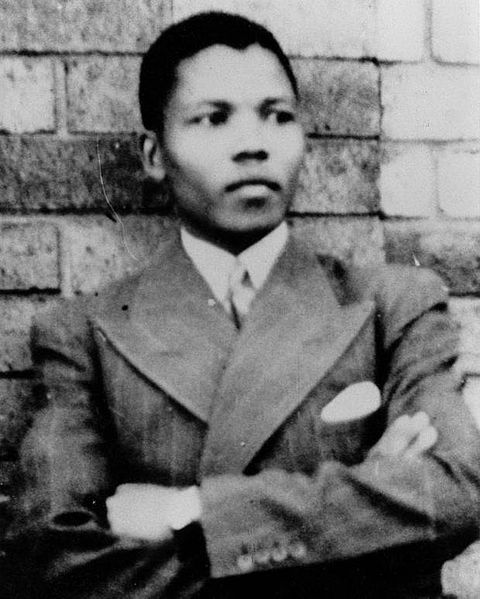

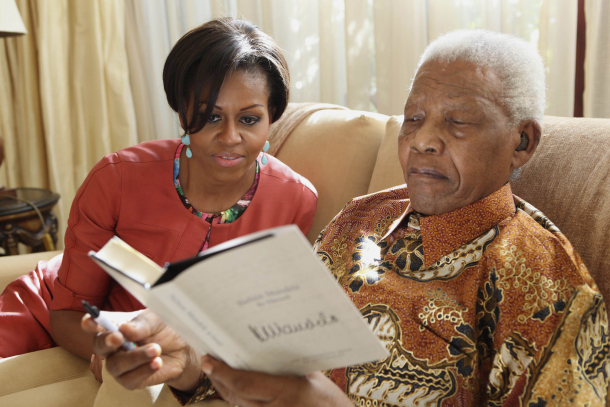
Nelson Mandela Facebook Cover Images;
Get lot of Nelson Mandela Facebook timeline Cover images here.
Nelson Mandela Quotes:
Let there be work, bread, water and salt for all.
Money won’t create success, the freedom to make it will.
Education is the most powerful weapon which you can use to change the world.
Read lot of Nelson Mandela Quotes here.
Read here the inspiring Statement of Nelson Mandela in 1964 Trial.
Nelson Mandela Timeline:
1941-1943 – Mandela meets Walter Sisulu who helps him get a job at the law firm.
1944 – Joins the African National Congress (ANC)and helps found the ANC Youth League.
1951 – Becomes president of the ANC Youth League.
1952 – Opens the first black law partnership in South Africa with friend Oliver Tambo.
1952 – Leads the newly launched [ANC] Campaign for the Defiance of Unjust Laws, a program of nonviolent mass resistance.
July 1952 – Mandela is charged with violating the Suppression of Communism Act.
December 5, 1956 – Mandela is among 156 resistance leaders arrested and charged with high treason.
March 21, 1960 – In Sharpeville, police fire upon protestors challenging apartheid laws; 69 people are killed.
April 8, 1960 – The ANC is banned nine days after Mandela is arrested and the government imposes a state of emergency after the events in Sharpeville.
March 29, 1961 – Mandela and all co-defendants are found not guilty of treason.
June 1961 – Mandela begins organizing the armed struggle against apartheid Umkhonto we Sizwe (Spear of the Nations). He travels in Africa and Europe studying guerrilla warfare.
August 5, 1962 – Is arrested on charges of inciting workers to strike and leaving the country without valid travel documents. Mandela represents himself at trial.
November 7, 1962 – Is sentenced to prison, five years hard labor.
June 12, 1964 – Is sentenced to life in prison for four counts of sabotage. Convicted and sentenced with Mandela are Walter Sisulu, Ahmed Kathrada, Govan Mbeki, Denis Goldberg and others.
1980 – The Johannesburg Sunday Post leads a campaign to free Mandela. A petition demanding his and other ANC prisoners’ release is printed in the newspaper.
1982- Is transferred to Pollsmoor Maximum Security Prison after 18 years on Robben Island.
1988 – Is transferred to Victor Verster Prison.
July 5, 1989 – Meets with President P.W. Botha.
August 15, 1989 – Botha resigns as president and head of the National Party. F.W. de Klerk replaces him and begins dismantling apartheid.
December 13, 1989 – Mandela and de Klerk meet for the first time.
February 11, 1990 – Mandela is released from prison after more than 27 years.
1990 – Embarks on a world tour, visiting Margaret Thatcher, the U.S. Congress, and U.S. President George H.W. Bush.
July 1991 – Mandela is elected president of the ANC.
1993 – Mandela and de Klerk share the Nobel Peace Prize.
April 29, 1994 – Elected the first black president of the Republic of South Africa in the first open election in the country’s history.
May 10, 1994 – Mandela is inaugurated.
June 1999 – Mandela leaves office.
1999 – Establishes the Nelson Mandela Foundation.
January 19, 2000 – Addresses the United Nations Security Council, appealing for help in ending the brutal civil war between ethnic Hutus and Tutsis in Burundi.
July 25, 2001 – Announces that he has prostate cancer and is undergoing treatment.
January 31, 2003 – Mandela criticizes President Bush’s stance on Iraq, saying he has no foresight and can’t think properly.
November 29, 2003 – Aids awareness event, the 46664 Concert (Mandela’s prison number) at Green Point stadium in Cape Town. The event draws 30,000+ fans with performances by Beyonce, Peter Gabriel, Bono, Bob Geldof and many more; and speeches by Mandela and Geldof.
December 1, 2003 – Mandela participates in the signing of the Geneva Accords for peace in the Middle East.
January 7, 2005 – Announces that his son, Makgatho, has died of AIDS and that the disease should be given publicity so that people will stop viewing it as extraordinary.
March 21, 2005 – Hosts the “46664 concert” in George, South Africa, to promote AIDS awareness.
August 29, 2007 – A bronze statue of Mandela is unveiled in Parliament Square in London.
June 27, 2008 – A London concert is held at Hyde Park in honor of Mandela’s 90th birthday (on July 18) with all proceeds going to an AIDS charity. It is estimated that about 40,000 tickets were sold.
July 18, 2009 – The Nelson Mandela Foundation creates Mandela Day to be held every year on his birthday. The purpose of the day is to bring awareness to community service.
November 11, 2009 – The United Nations declares July 18th Nelson Mandela International Day.
December 11, 2009 – The movie Invictus, starring Morgan Freeman as Mandela opens in South Africa, Canada and the United States.
February 11, 2010 – On the 20th anniversary of Mandela’s release from prison tributes, commemorations and marches in his honor take place.
June 11, 2010 – Mandela makes his first World Cup appearance before kickoff of the final match.
January 26-28, 2011 – Is hospitalized in Johannesburg and treated for an acute respiratory infection.
June 21, 2011 – Meets with U.S. First Lady Michelle Obama at his home in South Africa.
February 25-26, 2012 – Enters and is released from a Johannesburg hospital, while there undergoes surgery for an abdominal hernia.
March 2012 – The Nelson Mandela Digital Archive Project is launched. Google gives a $1.25 million grant to help preserve and digitize thousands of archival documents including items donated by Mandela himself.
December, 6, 2013- Nelson Mandela has died at the age of 95.
Watch below the 13 minutes documentary about inspiring life of Nelson Mandela.

